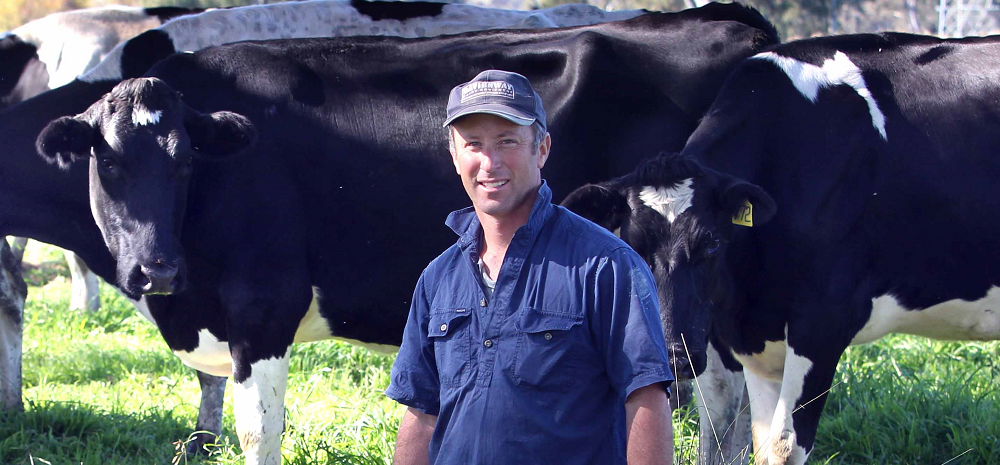One of the great surprises of Stuart Crosthwaite’s Melbourne university years was being elected president of his hometown cricket club in north-east Victoria.
As a dairy farming teenager “too shy to put his hand up in class”, Stuart had no ambitions for leadership roles, nor to become a fifth-generation farmer when he left for university with his sights on engineering.
His life goals altered after switching to an ag science degree, working as a field officer for Murray Goulburn in western Victoria, and eventually returning to the family farm at Kergunyah South.
Stuart, 46, now runs a thriving dairy operation, mentors a future generation of farmers, is founding chair of dairy co-operative Mountain Milk, and is participating in the 15-month Australian Rural Leadership Program (ARLP), sponsored by Gardiner Dairy Foundation.
While paving a new direction for the family farm, Stuart inevitably landed on various committees, including Alpine Valleys Dairy Incorporated which established a successful strategy to increase the region’s milk production.
“I’m proud to say the north-east has probably grown our production by 20 to 25 per cent in the last decade,” Stuart said.
Unhappy with the ailing Murray Goulburn, Stuart and five farming peers formed the north-east Victorian dairy co-operative Mountain Milk two years ago.
The co-operative, chaired by Stuart, has grown to eight members with a vision to produce its own bottled milk, while also increasing its collective negotiating strength with processors.
With so much leadership experience on his résumé, Stuart says his innate style was a “doer”, directing people with “black and white instructions”.
But the ARLP has been transformative: Stuart now role models a more inclusive style of leadership which he hopes will ripple through his business and wider dairy industry.
“I have learnt a lot about myself, and how my style affects the people around me,” he said.
“I have a better understanding of how connecting with the people around you can get a better outcome for the team.”
Learning self-awareness has also helped Stuart appreciate the need to manage his own workload and “help others carry some of the load”, in turn, fostering their leadership capacity.
“My leadership style is now more of a facilitator than a footy captain,” he said.
“I sat down with my staff and we developed our own core set of values. They said, ‘We want more teamwork, communication, and responsibility.’ ”
Stuart’s three staff now have an area of responsibility – assistant herd manager, assistant feed manager, or assistant maintenance manager.
The team has consistent communication, each member contributing to a Google sheet which is live across their phones, displaying jobs lists’, rosters and other information. They also communicate via What’s App and have monthly team meetings.
Stuart diarises an annual performance and salary review with each staff member, and supports their participation in industry courses.
Herd manager Angela Dunstone, 32, is rapt to have more responsibility and training opportunities in her field of interest, and said Stuart’s leadership style made her feel “valuable to his business”.
Stuart has learned that inclusive leadership helps enthuse and retain employees.
“I value that my staff can see opportunities for improvements, and I really want them to have input into that,” he said.
Stuart also values his participation in the ARLP, which includes immersive experiences in the remote Kimberley region, regional Australia, Perth, Canberra and Vietnam.
The iconic program takes more than 30 remote, rural and regional leaders from diverse industries throughout Australia to develop their capabilities.
“A lot of people think you are born a leader, but I have learnt leadership can be taught,” he said.
“I’ve learnt to be more aware of the people around me, and more aware of myself.”
Stuart said the program had shown the value in networking to achieve positive outcomes, and was teaching him the “three A’s of leadership – awareness, adaptability, and authenticity”.
With increased self-awareness and perspective on other people’s values, Stuart feels better equipped to motivate and nurture his dairy industry peers.
“You learn from everyone in the ARLP cohort. It’s a really supportive atmosphere.
“I’ve learnt it’s okay to be a little bit vulnerable and admit you are wrong and ask for advice,” he said.
With his farm “humming along and co-ordinating itself”, Stuart’s new leadership style has allowed him to be “more present” with family and friends, while also sharing his passion for the industry.
He believes the ripple effect of role-modelling and influencing more leadership within all tiers of farm life is an enduring return on investment.
“Change takes time and you need to build a snowball and have someone to keep pushing it, otherwise it will lose momentum and die.
“There needs to be a really long-term strategy in agriculture to push that snowball because it’s about bringing the next generation in to be innovative and take things to the next level.”

